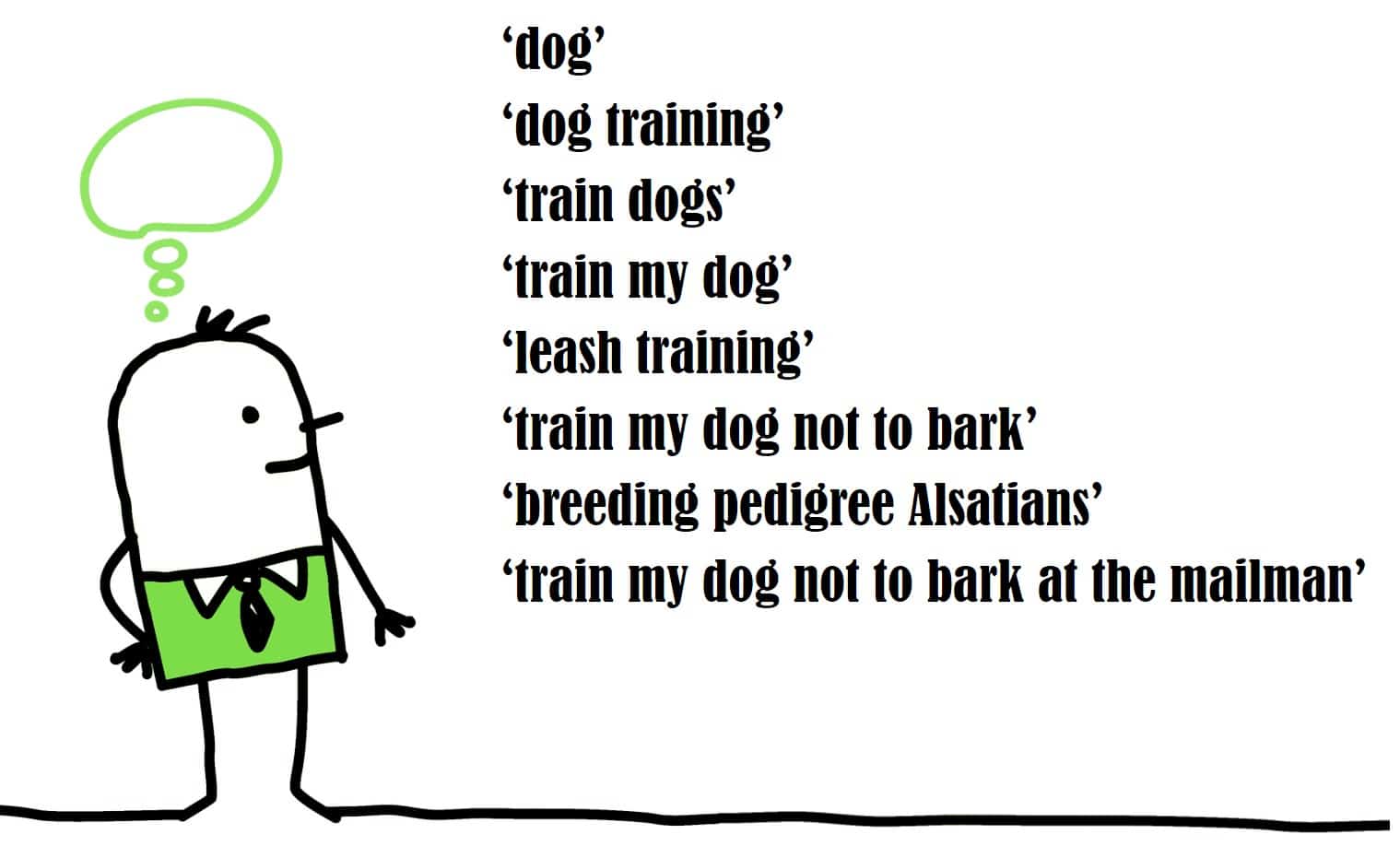From Keywords to Natural Search
Historically every SEO campaign started with keyword research. Or more accurately, key-phrase research. This means it is unlikely anyone in business would actively be trying to rank for ‘dog’. However, they might consider trying to rank for ‘dog training‘ or ‘train dogs‘ or ‘train my dog‘ and so on.
Things get more nuanced as we gradually get more specific, for example, ‘leash training‘ or ‘train my dog not to bark‘.
The Longer the Fewer the Easier the More Relevant
In general, the longer the key-phrase, the fewer searches there are for that key-phrase. However, the longer, the more specific the key phrase is, the more it will tend to drive more relevant traffic. If your business helps people train their dogs to do specific things, ranking for those specific things will mean your website will have visitors that are more likely to want what you offer.
Also, it is usually easier to rank for longer more specific phrases than shorter more general phrases. Hence it may be better to rank for ‘breeding pedigree Alsatians’ than it is to rank for ‘dog breeding’. Assuming of course that is consistent with what you do.
Through this thought process, we move from key-words to key-phrases to long-tail key-phrases.
An SEO campaign will therefore start with ‘keyword’ research. The goal of ‘keyword’ research is to identify all the relevant words, phrases, and long-tail phrases that are relevant to a business. It will then try to organize them into logical groups, relevance to the business, and search volume.
From Optimizing to Developing Content
People will often assume an SEO company will then just try to ‘optimize’ a website for those phrases. In reality, a good SEO company will go much deeper into the content and pages on a website to identify the extent to which specific pages are ‘about’ specific phrases.
Rather than thinking about optimizing a website for a list of key phrases, a better way to start the thought process is first to prioritize the key phrases, then identify or build, specific pages that are specifically about those phrases.
One Page – One Key-Phrase
The more a website has individual pages that specifically and exclusively focus on each phrase, the more likely it is to rank for those phrases. As a rule of thumb, think: one key phrase – one page. Conversely, exactly the wrong way to optimize a website is to try to make pages about (or optimized) for multiple key phrases.
It’s important to note that the above is just a guideline. There are instances where key phrases are so similar that it does not make sense to create separate pages for them. However, even closely related key phrases can often merit separate pages. For example ‘train my dog not to bark’, ‘train my dog not to bark when I am away’, ‘train my dog not to bark at the mailman’, all probably warrant separate pages.

Natural search is simply about creating content that is optimized consistently with the way people actually speak or ask questions. This is driven by the search engines getting smarter and being able to understand natural language questions as well as by the increase in voice-based search queries, particularly on mobile devices. Another factor may well be younger people growing up in a world where online search is taken for granted and that they expect their device to understand them.
The New Kid on the Block – Natural Search!
With those last key phrase variations, we start to move, just a little, into the realm of natural search. Natural search is simply about creating content that is optimized consistently with the way people actually speak or ask questions.
Therefore a natural search variation might be ‘how can I train my dog to stop barking every time the mailman puts a package on my porch‘.
The search engines, and people’s behavior when searching online, is evolving very quickly to natural search.
In other words, people are tending more and more to input full questions in this natural language form. Just the way they would if they were talking to a friend or member of their family.
This is driven by the search engines getting smarter and being able to understand natural language questions as well as by the increase in voice-based search queries, particularly on mobile devices.
Another factor may well be younger people growing up in a world where online search is taken for granted and that they expect their device to understand them.
A solid SEO strategy will therefore seek to understand the natural language used by the searcher in any given market. Then it will work to develop content that specifically uses that language in its long-form – just as people speak it.
For more solid SEO strategies see our eCommerce SEO case study and learn about the results achievable with organic SEO as against paid advertising.


